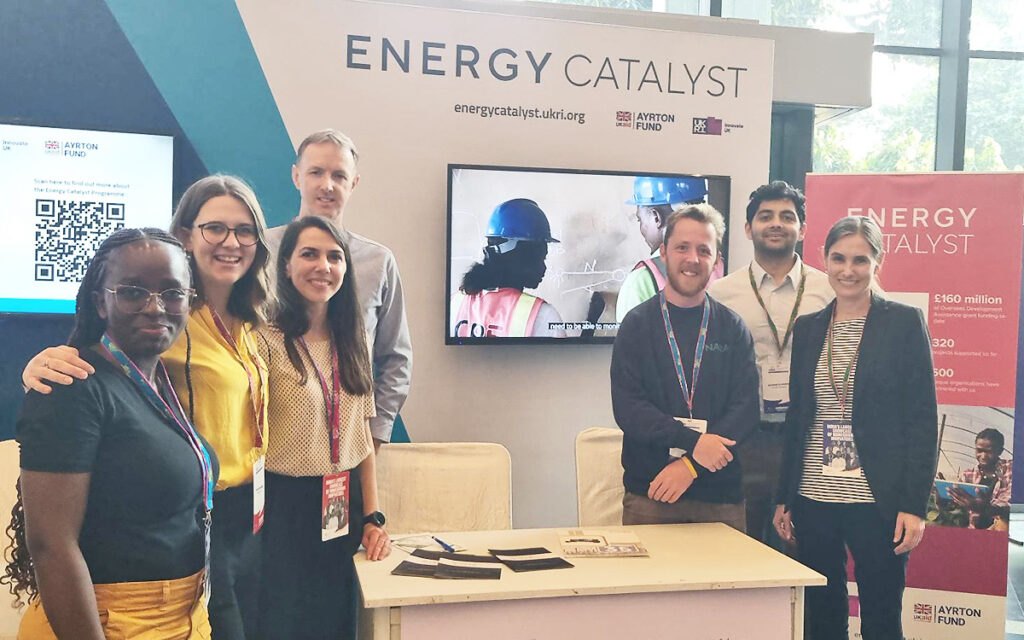Sankalp Bharat Summit 2024: Driving sustainable innovation in India and beyond
The Sankalp Bharat Summit 2024, hosted in Varanasi, India, on November 26-27, brought together over 700 delegates to discuss, define, and advance the critical levers of entrepreneurial success. Organised by the Aavishkaar Foundation, the event convened a diverse array of stakeholders from across the innovation ecosystem, including entrepreneurs, investors, and representatives from multilateral and bilateral organisations and government agencies. Central to the discussions was accelerating the clean energy transition in India and globally, with a focused examination of challenges spanning climate, finance, healthcare, gender, and more.

Energy Catalyst emerged as a significant presence at the summit, with its cohort companies—Straw Innovations, P.A.K Engineering, SCOPE OrxaGrid, Aptech Africa, SARVAAY Solutions, and Seawater Solutions—actively contributing to the dialogue. These innovators, either operating in India or exploring its market potential, engaged deeply in panel discussions and workshops under the summit’s theme, From India to the World: Impact Unicorns Shaping the Future. These sessions delved into opportunities within the climate economy and sustainable innovation ecosystem, offering valuable insights and forward-thinking strategies for India-based initiatives.
Energy Catalyst also hosted a session during the conference titled ‘Next-Gen Energy: Catalysing the Adoption of Sustainable Alternatives’, with leaders from Straw Innovations, Aptech Africa and SCOPE OrxaGrid discussing the intricate challenges of bringing clean energy solutions to market. Straw Innovations spoke about their solution for integrating grain and straw harvesting to mitigate the massive environmental challenge caused by burning rice stubble. On another important agricultural topic, Aptech Africa spoke about how their solar water pumping and irrigation solutions for small-scale farmers integrate flexible payment options to improve affordability. SCOPE Orxa Grid spoke about tackling electricity distribution challenges, including energy losses and power outages, by connecting and managing more renewable energy sources through their grid analytics platform. Whilst their innovations tackled a range of challenges with different solutions, the companies were united in calling for more supportive government policies, more flexible financing mechanisms, and deeper collaborative efforts across different sectors to mitigate development and adoption risks.
A particularly inspiring element of the summit for our delegation was the robust student representation thanks to the Youth Entrepreneurship Program run by host Avishkaar Foundation. Their participation brought home the critical importance of mobilising younger generations to pursue green job opportunities, and Vallary Sinaywa from Strathmore University in Kenya exemplified this potential. Joining the Energy Catalyst cohort, Vallary is a member of one of the winning teams in the Efficiency for Access Design Challenge, a TEA-funded multi-disciplinary competition that provides acceleration support to teams of university students to develop affordable and high-performing off-grid appliances and enabling technologies.
Together with her teammate Joy Muntet, Sinaywa capitalised on some great opportunities to discuss her team’s groundbreaking smart solar irrigation system with soil moisture sensors to optimise water usage for small-scale farmers with other innovators and industry stakeholders. Her reflections captured the summit’s spirit of collaborative learning: “It was a fantastic opportunity to discuss our concept with engaged visitors, receive valuable feedback, and gain insights into our value proposition, product positioning and pricing strategies. It was also great to share my experiences of participating in the Efficiency for Access Design Challenge with students from the local Banaras Hindu University.”
For Energy Catalyst companies, several aspects of the summit proved particularly valuable. Sessions on investor readiness underscored the critical project elements innovators must demonstrate to attract investment, such as traction, proof of concept, product acceptance, and a clear funding rationale. Live deal rooms provided platforms for SCOPE OrxaGrid and Aptech Africa to pitch directly to climate tech investors. The delegation appreciated the consistent emphasis on spurring collaboration between financiers, philanthropic funders, and industry leaders to address the unique challenges of the energy transition, and welcomed insights from speakers from ACT Grants, Climate Collective, H&M, and UNIDO on fostering a supportive environment.
Tresta Mansfield from the Carbon Trust, who co-led the delegation, shared her reflections: “For me, the summit underscored the importance of nurturing strong and mutually beneficial relationships between investors and innovators. Innovators are central to the energy transition, and investors must critically examine whether their funding instruments truly support founders’ needs. While capital exists, investors should design sophisticated blended finance instruments and encourage co-financing between traditional funders and philanthropies. For their part, clean energy entrepreneurs should seek to strategically align their innovations with national priorities and policies to attract investment.” The discussions, connections, and insights generated in Varanasi will likely reverberate through the wider innovation ecosystems, propelling forward-thinking solutions that have the potential to address some of our most pressing environmental and social challenges.